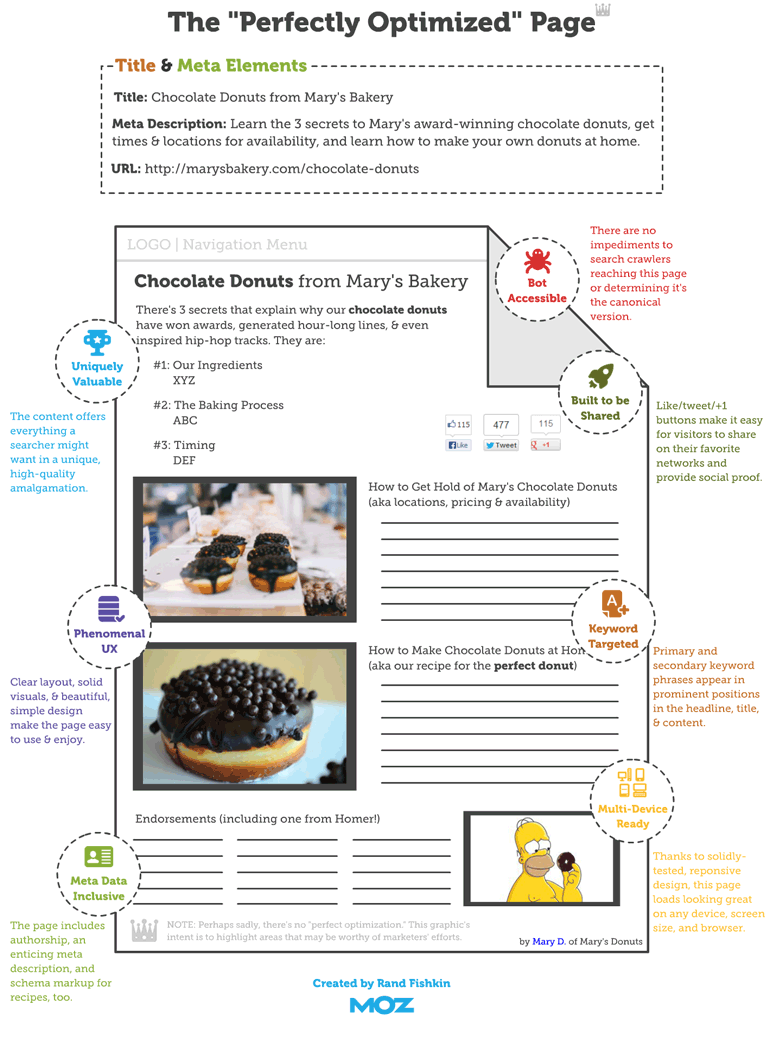SEO 101. Helping search engines understand the content of a website.
An overview of tasks and strategies you can employ on your website to help search engines understand your website and content.
Below is an image of the anatomy of a fictional 'perfectly' optimised page. Refer to this image when reading the following sections.

On Page SEO factors
These are the elements of any given page which will assist a search engine in understanding the content of the page.
- The content (main copy) of the page.
- The page title.
- The page URL.
- The meta description.
- The headings.
- Image alt attributes.
- Image filenames.
See the image on the following page for a hypothetical example of perfect page optimisation of these factors.
Search Engine Results
Search engine results include the page title, meta description and URL; as they appear in the image above.
The page title is an important signal used by google to determine keyword matching and ranking (most important after using keywords in the main content of the page). It is also useful in search results for visitors to understand what they are clicking through to.
The page description is not used by google for ranking purposes but it is displayed in search results as a descriptive summary of the page. This means it is essentially ad copy whose role is to summarise the page content and to entice the searcher to click through. Meta descriptions should be unique for each page and should accurately describe the content of the page.
How to write Alt text (Alternative text)
“Alt text is text that can be replaced for the image, to convey the same content and still make sense in the context of the adjacent content.”
- Alt text should present the same content as its image as if communicating to a blind user (google is also blind).
- It should be succinct. A few words to a sentence is all that is normally required.
- It should contain your keywords when appropriate. They don't need to be 'stuffed' into everything and this is penalised if done unnaturally or excessively.
- Shouldn't contain redundant information e.g. ‘this is an image’ of ...
- Shouldn't be a direct repeat of text already present in the page.
Wikipedia has a useful entry on the alt attribute.
So the true purpose of alt text is to assist visually impaired users understand the image within the context of the page. A side benefit of this is it enables search engines to better understand the site.
How to write page titles
- Maximum of 70 characters before cropping by search engines.
- Make sure every page has a title.
- Titles should be concise and descriptive.
- Titles should be unique for pages in the same website.
- Their purpose is to give users a quick insight into the content of a search result.
How to write meta descriptions
Meta descriptions are not a factor used by Google for ranking purposes. It is ad copy really and supports the page title to inform and entice searchers to click through.
- Should be a concise explanation of the contents of the page it is written for. Directly relevant to the page and unique for each page in the site.
- Maximum length is 155 characters. After this point it gets truncated by Google.
- Try to only use numbers, letters and basic punctuation.
- More important for the most important and most visited pages.
- The deeper into the site we get the less we focus on your core set of keywords. Save focusing on the most important keywords for the most important and relevant pages.
- Don’t engage in keyword stuffing (using keywords where they aren’t relevant). They can be spread out and don’t need to be repeated just for the sake of it.